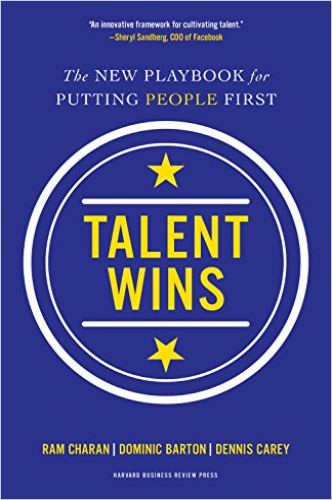Ram Charan, Dominic Barton and Dennis Carey explain why you must make talent your first priority even thought that may mean entirely revamping your approach to business.

Talent First, Talent Foremost, Talent Above All
Ram Charan, prolific author and sought-after strategic advisor to CEOs, Dominic Barton, leader of a foremost strategy consulting firm, and Dennis Carey, a senior executive of a major HR services company, join together to promote the primacy of talent. The authors believe talent always outweighs finances and other considerations. Their message: talent must be your strategy.
If you want to scale the individual talent in your company, embrace the idea that you’ll need to reward that talent in new and customized ways.Ram Charan, Dominic Barton and Dennis Carey
Writing in the tone of a personal letter to CEOs, Charan, Barton and Carey advise leaders and board members to spend at least half their time and effort on people issues, to elevate HR to a firm’s highest decision-making ranks and to field a Chief Human Resources Officer (CHRO) whose power almost equals the CEO’s.
Sheryl Sandberg, COO of Facebook, said the authors, “provide an innovative framework for cultivating talent and show that diverse teams are critical to unlocking an organization’s full potential.” William McNabb, chairman of The Vanguard Group, wrote, “Charan, Barton and Carey turn conventional views about human resources on their head and create the ultimate playbook for making human capital the ultimate edge for organizations of all types.” Denise L. Ramos, CEO and president of ITT Inc., called this, “A groundbreaking book for the next 20 years that focuses CEOs’ attention on the strategic value of employees and the necessity of bringing HR into the leadership circle. A must-read!”
Talent Has Become Strategy
Describing their own learning experiences, Charan, Barton and Carey point out that although business and the economy changed profoundly in recent decades, most organizational structures still address the last century’s challenges. The authors’ thematic concern — which they repeat throughout – is that your depth and quality of talent and how you manage talent differentiate successful firms.
Financial management remains important, but in an era of cheap and abundant capital, the authors maintain, it doesn’t differentiate. Your company needs both fiscal strength and strong talent to pursue meaningful strategic results. The authors join legions of thinkers and gurus before them in stating that talent has become strategy, and that CEOs must include talent management among their direct responsibilities and highest priorities.
You can’t meaningfully empower the talent below without the full commitment of leadership above. This is a top-down revolution.Charan, Barton and Carey
Today’s most celebrated and successful companies, the authors reiterate, practice exceptional talent management. They hire, onboard, retain, inspire, develop and utilize their talent more adeptly than traditional firms do, and they earn a reputation as a place where innovative, motivated people want to work.
Elevate HR and the CHRO
The authors insist that CEOs must act as chief recruiters and retainers, and should elevate HR’s role. They call for creating a high-ranking position for a Chief Human Resources Officer (CHRO), someone who exhibits confidence and courage and, the authors stress, has a strong personality and sense of mission. The authors recommend that the CEO, CFO and CHRO form a leadership triumvirate that sets strategy in the context of money and talent. Showing their ruthless side, Charan, Barton and Carey say chief executives should replace any board members who oppose a talent-first strategy.
Putting talent first means a complete transformation of the way most companies have done business for decades.Charan, Barton and Carey
The authors suggest using artificial intelligence, account management automation and offshore resources to augment your human resources efforts by hiring HR professionals who can glean insights from data and turn those insights into company-wide initiatives.
Charan, Barton and Carey urge you to recognize the critical top 2% of your employees – the highest performers in the most pivotal and important positions. The authors advise investing in your 2%, developing, inspiring and retaining them in positions that best serve your firm. Focus most on your finest, they emphasize, and pay them on an entirely different scale than other employees. Charan, Barton and Carey make a subtle, crucial point: Aware firms, they say, ensure that top technical talents can advance without having to switch into management roles.
The authors put the acquisition, integration and utilization of modern HR technologies in their top three must-dos – along with forming the G3 and leveraging the top 2%. They point out that HR technology now enables leaders to hire and onboard more adeptly, to see and know their talent, to predict ideal team scenarios and to discern where to deploy their people.
Talent, Charan, Barton and Carey say again and again, is today’s scarcest resource, so, they propose, you should even consider purchasing companies purely to acquire their talent – but only after performing a “talent audit” of any potential acquisition’s top 2%.
Be prepared to buy startups, lure whole teams of people from another company, bring contractors under your roof full-time – whatever it takes to get whatever talent you need.Charan, Barton and Carey
To aid retention, the authors recommend investing in training and development for every employee. They advocate developing a dynamic, interactive feedback system that uses frequent employee reviews to empower fair and responsive paychecks, bonuses and incentives.
Charm
Charan, Barton and Carey are consultants and presenters with years of experience. They write with the skill and warmth of professionals who have spent their careers telling other professionals how to improve what they do. That requires exercising great diplomacy, so the authors avoid suggesting that certain areas of ignorance reflect poorly on the reader.
Talent is king. Talent, even more than strategy, is what creates value.Charan, Barton and Carey
They insist that most people – including themselves – are latecomers to the realization that talent is strategy. Their willingness to admit their own blindness is only a small part of the charm of their style and the subtle intelligence of their guidance. Still, that guidance vests in real world pragmatism. The authors explain precisely how to boost profits and lengthen employees’ tenure by embracing talent. Charan, Barton and Carey’s insights provide a wonderful addition to HR’s business case for taking on greater responsibility and a higher role in corporate echelons. The authors’ counsel will enrich all leaders, board members and ambitious HR professionals.
Ram Charan also wrote The Leadership Pipeline, What The CEO Wants You To Know and The High-Potential Leader, among other titles. Dominic Barton coauthored Re-Imagining Capitalism. Dennis Carey co-authored Go Long and Boards That Lead. Carey also founded the CEO Academy, an annual gathering of the nation’s top business leaders.












